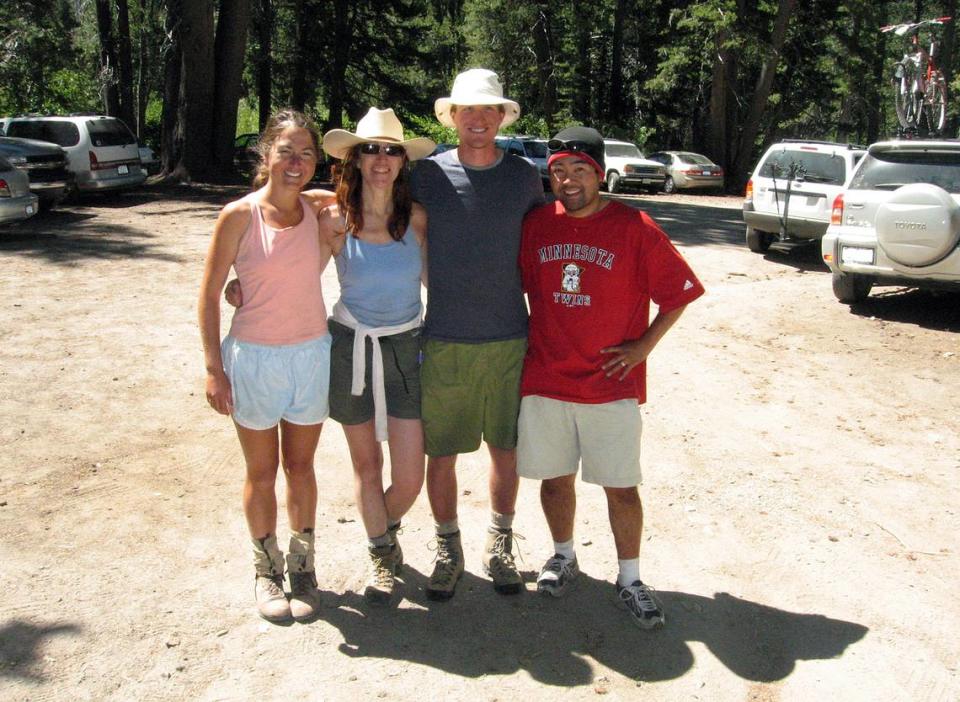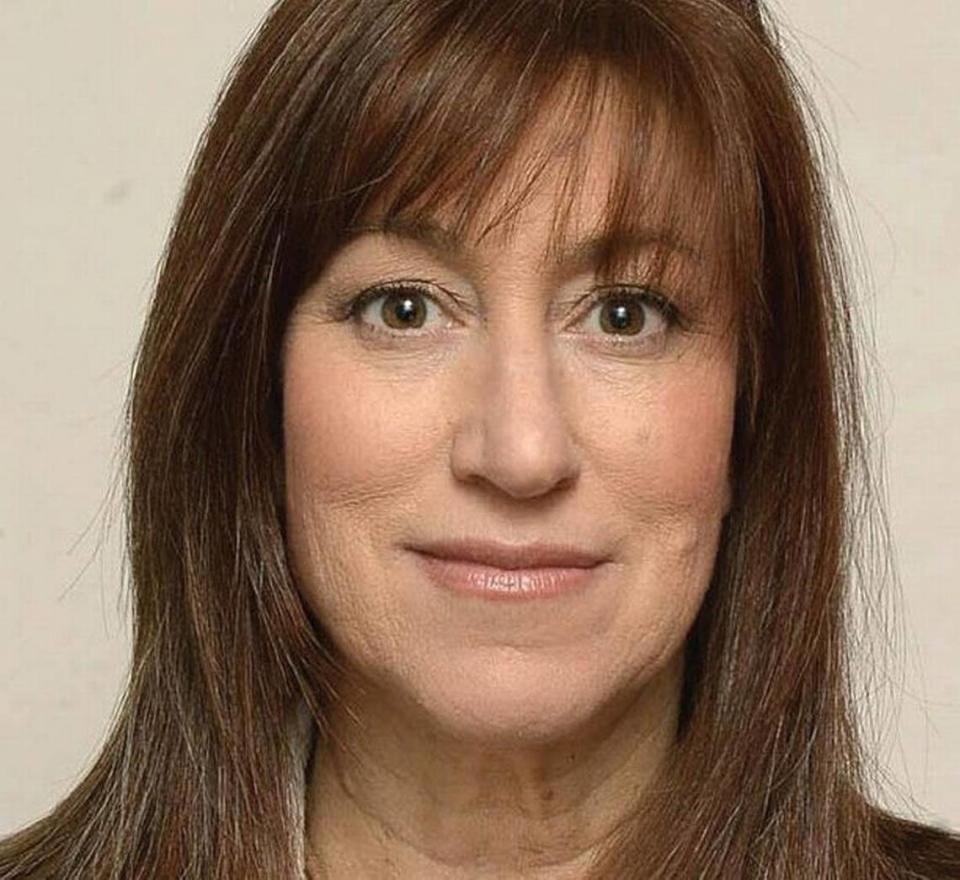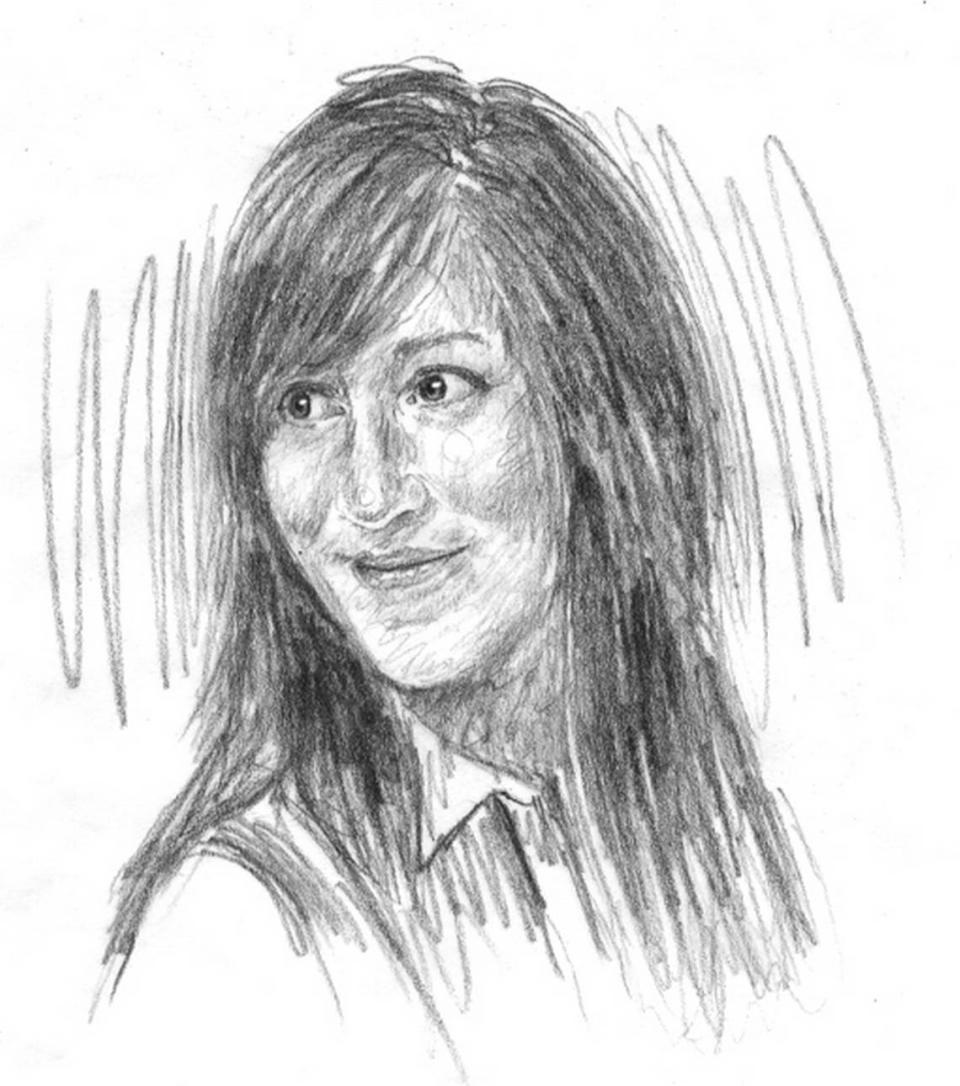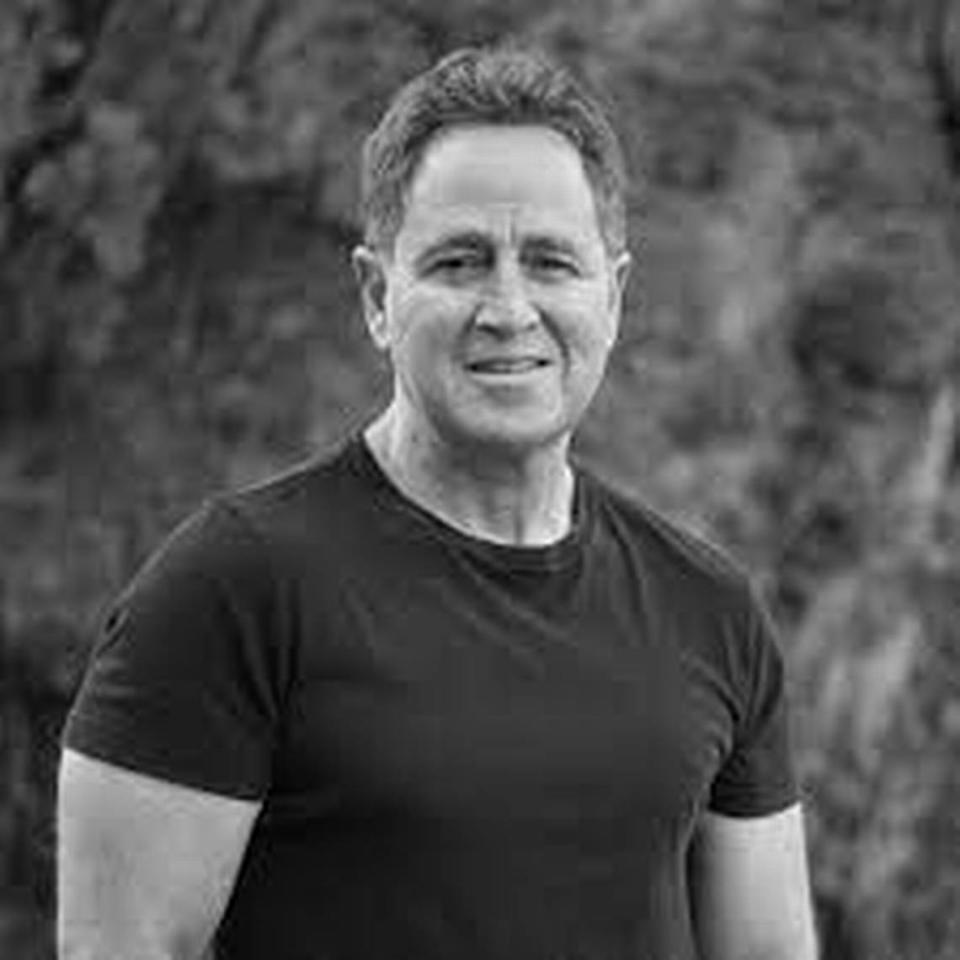Mark Arax’s last visit with dying friend Diana Marcum: What else could they do but dance?
- Oops!Something went wrong.Please try again later.
I walked up to the little Craftsman bungalow on Linden Avenue in Fresno’s Tower District the other day to say goodbye to a friend.
Her name was Diana Marcum and she was a journalist for The Fresno Bee and the Los Angeles Times, among other California newspapers, and her talent for writing lyrical prose was such that she had won a Pulitzer Prize in 2015 for stories about how plain folk in the Valley, if you bothered to stop and talk to them, allowed you to see the dignity with which they were surviving a great drought.
In the days before my visit, as her death grew near, Diana’s longtime boyfriend and travel mate, Mark Crosse, asked me to prepare her obituary for The Bee. I was familiar with the drill, having been an obit writer for the paper one summer when I was a kid.
Try as I might, though, her obituary did not come easy. The form seemed too confining, the tone too somber. Diana was anything but a force confined. And her whole life had been about avoiding the somber. As I tried one sentence and another, I kept hearing her voice, slightly annoyed, in my head.
“Arax, a traditional obit, really?” She pronounced my name R-Ox, the way my grandparents from the old country did. “I’ve never been about convention. You’ve never been about convention. Might you try a different approach?”
“Sure. We can tear it up and start again, D.”
“Wonderful. But you have to make it funny. Don’t make it tragic. You’re always making things tragic. You know you can be very funny when you want to be.”
“Okay. I’ll put a little humor in it. But only if you let me tell the story of Lenny Bruce.”
Her voice went silent.
Meeting Diana
Time compresses. Time elongates. Whose time do I believe? Was it December 1997 when she first introduced herself to me?
I had written a story about the high school cross-county team in little McFarland — state champions five years in a row — that made Column One in the L.A. Times. She was calling from the desert in Southern California to tell me she had read the piece twice. She wasn’t stingy with a compliment. She was generous in a way a lot of writers aren’t.
Back then, I was a Times staffer in Fresno covering the middle of the state. She was a Times freelancer hustling from Indio to Mojave to Palm Springs. Our stories sometimes appeared in the same edition. I was making a good living at it. She could barely afford rent and groceries.
She got her break a few years later when Charlie Waters, a Times features editor, landed the job of editor-in-chief at The Bee. Charlie was a guitarist in a rock band who smoked like a fiend, and he was hiring talented journalists from across the country to come to Fresno. A gig in raisin city, say two or three years, was a last bit of seasoning before making the majors. Diana climbed aboard.
“She’s got the music,” Charlie told me.

Diana was now roaming the same turf I roamed, which made us competitors. As much as we rooted for each other, I couldn’t always tell her my movements because we shared the same nose for stories — places and people off the path, on the other side of the tracks. She’d pull into Alpaugh or Pixley or Fairmead, only to discover I’d been there days, months or years before. “Is there any spot in this Valley you haven’t peed on?” she asked.
Her humor could be wicked. It was a family trait, she said, and didn’t say more. She was quirky and spontaneous and a great believer in the pursuit of joy. She was single at the time and always dreaming of some paradise. Let’s go here. Let’s go there. She drove me nuts with questions ever more obscure. “R-Ox. If something is a myth does that mean it’s fake or real?”
Her big dogs, first Mac, then Murphy, wouldn’t stop hounding me. “What is it about dogs that makes you recoil?” she asked.
I told her a neighbor’s collie had bit my thigh when I was a child. It didn’t help that every dog we brought into our home met an early death. I found Champ, our German shepherd, in the gutter on Olive Avenue. I was walking to a pickup football game at Ewing Elementary, and there he was. Run over by a car. By the time animal services arrived, he was twice his size and swarming with flies.
“That’s such a horrible story,” she said. “No wonder.”
Our friendship deepened. Our friendship helped get me through my divorce. I sensed that she carried her own wound from childhood, but she did not like to talk about it. “Why dwell on such things?” she told me. “There’s too much to be happy about.” She happened to be talking to a son who had spent 30 years trying to solve the riddle of his father’s murder.
Now and then she’d confide a detail or two about her past. She’d been adopted by a Seventh Day Adventist couple when she was a baby. They lived in a trailer park in San Bernardino. They were good people who stuck to their religious beliefs and did not eat meat, drink alcohol or smoke. They taught her these habits, but didn’t otherwise try to clip her wings. They conceived a child of their own, a boy. Then when Diana was 17, both her parents died of horrible diseases that came out of nowhere in the same year.
She was left with no savings and a troubled brother who thought his eyes could shoot laser beams that would stop the world in its tracks. She was determined to not let social services take him. She raised him by herself. This is why Diana couldn’t accept the admissions letter to UCLA. She went straight to work at Winchell’s donuts until her brother was old enough to find his own way and she was free to pursue her dream of writing.
She was never consumed by a need to find her birth parents. Too much melodrama, she told me. And yet the mystery of who they were did shadow her. She had picked up enough information to believe that her mother, still living, had been a Southern California leg model who had a brief affair in 1962 with Lenny Bruce, the legendary comedian who died of a drug overdose. Bruce was likely her father, she said. It explained her gift of humor. It explained her lack of a turned up nose. She kept a video of the movie “Lenny” starring Dustin Hoffman on the TV stand, but hadn’t dared played it.
“That needs to be your first book, Diana. Searching for Lenny Bruce.”
“Oh, R-Ox,” she said with a dismissive hand. “I knew that would be your reaction.”

Not long after, she walked into my condo and announced that her feelings for me had grown fonder. Might we be a real couple? I didn’t know how to tell her that I did not feel the same. As a way not to hurt her, I never fully explained what was and wasn’t in my heart. I left the matter up in the air and ended up hurting her even more. When I finally came clean, I tried to do it with humor.
“You’re a writer telling stories of this place. I’m a writer telling stories of this place. You’re a copper-headed ginger. I’m a copper-headed ginger. You’re a Jew, at least half. I’m an Armenian, full. We’d end up killing each other, Diana.”
I hoped she’d laugh. She chuckled and then let go of the idea of our romance the way writers sometimes do. She wrote a much-admired book about a paradise she found on Azores Islands, a balm to the romantic rejections of a Fresno character she called M.A., short for Manly Author. M.A. was somewhere in the opening pages and then gone, mostly a literary device to get Diana to the tenth island where she found love requited. Before she turned the manuscript in, she asked if I cared to edit her portrait of me.
“I appreciate the courtesy, D. But you don’t need me reading over your shoulder.”
“Thank you, M.A.”
I would read enough of her book when it was published to understand she’d been kind.
Covering the Valley
Blot out the byline and you knew it was a Marcum story by the third paragraph at the latest. Her pieces announced themselves for many reasons: the people she chose as subjects; the respect she gave them; the banishment of university words so that she wrote in the manner of their everyday talk; the polished and often witty leads; the sentences deceptively simple like haiku; the quieting of words that gave the reader credit for being able to figure out what she had chosen not to write, because the unspoken had its own meaning; the words she picked and positioned for the way they looked on the page, because spare was a visual language, too.
She had a near perfect memory for speech, sound and scene. She hardly took notes. This allowed her to fully see and hear what was taking place in front of her and off to the side, as well. She was a nightmare for editors who cared more about control than language. She’d vanish for days at a time. The newsroom was a lousy place to write. The ditch bank or the coffee shop or the front seat of her car or the little back room of her bungalow were much better places.
“Where in the hell is Marcum?” became the frustration of nearly every one of her editors, which became a delight to Diana. When she finally did turn in her story, she knew it would redeem everything, if not mend all.
Her call up to the majors came in 2011 when the L.A. Times offered her my old job covering the Valley. She had to fight the same fight I did, resisting assignments of breaking news — disasters and murders and citrus pests — to be free to pursue the stories that sang.
I smiled when I read her feature about Azorean Portuguese immigrants transplanting their centuries-long tradition of bullfighting to the Valley, only with a twist. The huge bull wasn’t subdued by sword or spear. The fighters, forcados, used Velcro darts instead. They jumped on its head, pulled its tail, spun it into a dizzy stupor.
“Ask any forcado why he stands unarmed in front of a charging bull and he’ll tell you he’s crazy.
Anyone watching would have to agree.”
She did not toss her notebooks into a box and forget about the people in them. Often, she sought them out again, this time to become friends. See the pictures of Diana’s life — her smiling, laughing, dancing, hosting parties, cooking enchiladas, mixing margaritas, handing out “Diana presents” — and you’ll find that half the friends around her were gifts of her storytelling. Didn’t journalists need to practice objectivity with their subjects? For Diana, there was nothing objective about being a human being.
Maybe she never stopped regarding herself as an orphan. Maybe under all that effervescence brooded something darker she could not bear to tap into. If so, how amazing it was to see a life spent finding friends she could call family and keeping not a handful of them but a whole legion: in the Tower District and on the northside and in cities and towns across the Valley and all the way to the Azores and Belize. They were of every kind. The best of the human race.
She had found Armen and Odet Hamayelian, immigrants from Iran who ran the old Kern Café downtown, and adopted them as parents 20 years ago. “My Armenian family,” she called them. She had found Mark Crosse, a retired Bee photographer, a stand-up guy, and they planted a garden in their home on Linden with lavender and salvia and bee balm that swept in the butterflies and bees and hummingbirds.
Now she was dying at the age of 60 from a brain tumor that would not relent. Like crabgrass, it was sending out tendrils of the most untamed kind. Damn the timing of it. She and Mark and her longest friend, Janet, had just bought a second house, this one in the Azores a stone’s throw from the Atlantic. She had just signed a deal for a new book whose subject matter she’d figure out later.

She had gone into a coma and come out of the coma and was lying in a bed on the far end of the Craftsman bungalow, her sunlit writing room. Mark had filled it with the sound of jazz. Her eyes were closed when I walked in, and they stayed closed for 20 minutes. I didn’t know what to say. I said everything and nothing.
I told her I always appreciated the old country way she pronounced my last name. Her eyes and lips began to quiver and then they opened.
“You think you’re the only Armenian in this room?” she said in a whisper.
I told her I loved her.
“I love you, too,” she said.
She was paralyzed on one side but on the other side her arm began to move to the jazz beat. She grabbed my hand and we started dancing with our fingers.
“You sure liked to stir up trouble,” she said.
“Yes, I did.”
“I liked the way we spurred each other on.”
I believed she was talking about our writing, if not life. She squeezed my hand tighter.
“I wish I could sing,” she sighed. “A song.”
“You did sing, D,” I said. “You sang.”
Editor’s note: Diana Marcum died Aug. 9 after being visited in her writing room by many friends and former colleagues.
Mark Arax, a Fresno resident, is the author of several books, including the recent national bestseller, “The Dreamt Land: Chasing Water and Dust Across California.”


